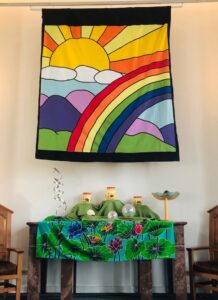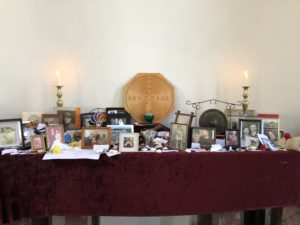Read the Order of Service.
Am I in the right sanctuary? I can see that some of you’re wondering. Isn’t this a Unitarian Universalistcongregation? What’s all this talk about “repentance” and “sin” and “God”? In some religious traditions you don’t talk openly about sex, for instance, or social justice. In ours …?
Yet we know – or should know – that religious language is, and always has been, poetry. There is no denying that certain words have been used … and I’d say misused … to justify some pretty egregious things. These words have been used to cause real harm to individuals, to cultures, and to our planet. Yet no matter how these words have been misused, our faith traditions insists that they are, and always have been, just words. No matter how literally some people have interpreted them, and interpret them still, our Unitarian Universalist traditions teaches us they are poetry – analogy and metaphor. Religious language is poetic language, language we humans have used in order to help us deal with what the Unitarian Universalist preacher Forrest Church called, “the dual reality of being alive and having to die.”
And we humans have been trying to find ways to deal with these two realities ever since we first became aware of living in between them. One of the gifts of our faith tradition is its encouragement to listen, with open minds and open hearts, to the others; its insistence that we “search for truth” wherever it might be found. And yes, that means mining even those words that were used to wound us in the past, or that seem irrelevant, literally meaning-less, to us.
So I’m going to talk about “repentance” this morning, and I don’t think you can get a deep enough, rich enough understanding without also talking about “sin.” So let’s start with probably the hardest one “sin.”
I think it fair to say that most people think that the concept of “sin” has to with the “bad” things we do and the “bad people” that makes us. When we “sin” we become “sinners,” or maybe we’re “sinners” from the moment of our births (or even before that). And being a “sinner” means that we’re unworthy; that we’re … well … perhaps the quintessential description of what it means to be “a sinner” was given by the Rev. Jonathan Edwards in his 1741 sermon, “Sinners in the Hands of an Angry God.” Even if you’ve never heard of this sermon, you’ve probably got somewhere in your mind that this is what Christian mean when they call someone a “sinner” because of their “sins:”
“The God that holds you over the pit of hell, much as one holds a spider or some loathsome insect over the fire, abhors you, and is dreadfully provoked. His wrath towards you burns like fire; he looks upon you as worthy of nothing else but to be cast into the fire. He is of purer eyes than to bear you in his sight; you are ten thousand times as abominable in his eyes as the most hateful, venomous serpent is in ours.”
I actually read this in High School, Edwards’ sermon being used as an example of mid-eighteenth century New England prose. And some variation of this is what most people think of when they hear the word “sin.” And there are people who continue to preach and teach this, and those who’ve said that this is our state from the moment of our conception! No wonder we reject it.
But with all due respect to the Rev. Edwards, and the people of the Westboro Baptist Church, this isn’t the Biblical understanding of “sin.” There are actually at least seven different Greek words that have been translated into the single English word “sin”:
Hamartia means, “to miss the mark.” It’s an archer’s term. You aim at something – in the theological sense you aim to be your best, your highest self – and you miss the mark. Can you relate? In this sense, I am definitely a “sinner.”
Hettema means “Diminishing what should have been given full measure.” Every time I am paying more attention to my Facebook feed than my kids, I am “sinning.” Can you honestly say that the word “sin,” understood as hettema is an irrelevant concept?
A third Greek word that’s been translated as “sin” is Paraptoma, which means “Falling when one should have stood.” I’ve read two different ways of understanding this. One is “slipping up,” but with the idea that it is more accidental than intentional. Say, perhaps, that you react to something someone said or did, and then you later learn the reasons why they said or did that and you feel just awful about the way you reacted. Paraptoma.
The other interpretation I’ve heard, rather than “falling when one should have stood,” is “sitting down when one should have stood,” and this is the underlying sense behind the idea that “silence is complicity.” Martin Niemöller ‘s famous words capture this sense perfectly:
When the Nazis came for the communists,
I remained silent;
I was not a communist.
When they locked up the social democrats,
I remained silent;
I was not a social democrat.
When they came for the trade unionists,
I did not speak out;
I was not a trade unionist.
When they came for the Jews,
I remained silent;
I wasn’t a Jew.
When they came for me,
there was no one left to speak out.
Paraptoma. Sin. There’s a lot of that going around these days.
Agnoeema, is another of the seven Greek words that are needed to really understand the Biblical concept of “sin.” Agnoeema means,”Ignorance when one should have known.” You ever say to your kids, or a friend, “you should have known better”? Ever felt the need to say that to yourself? That is a way to understand this word “sin.”
Parakoe means, “To refuse to hear and heed God’s word,” and while the word “God” doesn’t hold any meaning for some of us, this idea should. Because unlike “missing the mark,” which is an unintentional failure to do the right thing, the thing we know in the core of our being is the right thing, parakoe is an intentional refusal.
I read a book some years ago in which the author says that the vast majority interpersonal conflicts stem from a decision we make to betray ourselves. An example that’s stuck with me is of a man, lying in bed at night, who’s awoken by his baby crying. His immediate impulse is to get up and comfort his child, especially since his wife is still sleeping. Instead, he rolls over, pretending to sleep, hoping that his wife will wake up and take care of it. And because this betrayal of his true and best self casts the man in a bad light – something we never want to do – he begins to justify himself, telling himself that he needs a good night’s sleep because of the day he has waiting for him at work. Then he thinks of every example of his wife not doing things she should have. Pretty soon he’s lying there, feeling what he has convinced himself is justifiable hostility toward his wife whose sleep he just moment before lovingly wanted to preserve. This is parakoe. And if this doesn’t seem at all relevant to you …
Parabasis means, “To intentionally cross a line,” and, Anomia and Paranomia mean “Lawlessness, or willfully breaking God’s written rules.” These are clearly related to one another, and are differentiated, as I understand it, primarily by degree of conscious intentionality.
Has any of this resonated with you? Has any of this seemed relevant? To paraphrase Ralph Waldo Emerson’s assessment of the word “miracle,” “the word [sin] as pronounced by Christian churches, gives a false impression; it is Monster.” As such we are right to reject it. But the reason our faith tradition encourages us to, instists that we, be open to the “wisdom of the world’s religions,” is precisely so that we might look beyond the words as they are so often used and misused in order to find the truths they might have originally been pointing to. There’s a lot we can learn from this idea – or, I should say, these ideas – about “sin.”
So what about “repentance?” Isn’t that all tied up in that other concept of sin, that sense of worthlessness, guilt and shame? Well, it turns out not so much.
According to Baker’s Evangelical Dictionary of Biblical Theology, The word most often used in the Hebrew Scriptures to describe the Biblical notion of repentance is shub. It appears in verb form well over 1,000 times. The Theological Wordbook of the Old Testament says that it’s actually the twelfth most frequently occurring verb in the Hebrew Scriptures. In the Christian Scriptures, the word that is used most frequently to refer to this concept is metanoeó.
These words both mean, essentially, “to turn,” or, “to return.” There’s nothing about guilty groveling involved, no self-abnegation, no attempt to placate or pacify a power hell bent on punishing us for some breaking of the rules. “Repentance,” in this, original, sense is all about recognizing when we’re on the wrong path, heading in the wrong direction, and the act turning our lives around.
A young man named Malcolm Little was living a life of drug dealing, gambling, racketeering, robbery, and pimping. He had decided that the world as it was really offered him no other options. He was eventually caught and arrested, sentenced to eight-to-ten years in prison. During that time he met a man who was unlike any other he’d ever met. Self-taught and self-assured, the man became a mentor to Little, helping him to see that he could do better, that he could be better. When Malcolm Little was released from prison he had become the man we know today as Malcolm X. He had experienced shuband metanoeó. He had turned his life around, he had changed his mind and his heart, he had, in a word, “repented.” (Ironically, Malcolm had been an excellent student, aspiring to be a career in the law, until a junior high teacher told him that practicing law was “no realistic goal for a [Black person].”) Turn and return, you might say.
Have you ever felt the need to turn your life around, to head in a new direction? Oh Lord, I know that I have. Nothing as dramatic as the life change of Malcolm X, but I know the feeling that I’m going down the wrong path and that I’d better do something about it. And that’s really what the Biblical notion of “repentance” is all about.
When the Christian Scriptures were translated from their original Greek into Latin, however, an unfortunate choice was made. Metanoeo was translated as poetinere, and poetinere is related to the words “punish,” and “penance.” This beautiful, and truly meaningful, concept of recognizing the need to change one’s life’s direction became overshadowed by the idea that we needed to be punished for wrongdoing. Something entirely different.
This time between Rosh Hashana and Yom Kippur is a time for reflecting, not on all the ways we’re loathsome, hateful, abominable insects who deserve nothing more than to be thrown into an unquenchable fire. It has to do, instead, with reflecting on the ways we’ve missed the mark; ignored what is truly important; been quiet when we should have been raising our voices; reacted and judged before knowing the full story; made the intentional choice to put our short-term interest before our long-term values. In other words, to reflect on our sins in all of the ways that concept was intended – is still intended – to be understood.
And we are invited to do this – and I do mean that we, as Unitarian Universalists – are invited to do this so that we might repent, in the true understanding of that word. Because that is something we all need to do, and not just during the Jewish High Holy Days, but each day. Every day.












